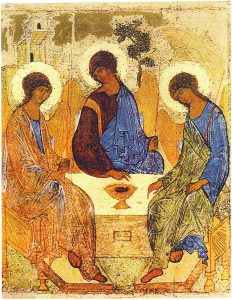HOMILY EASTER SEASON WEEK 03 02 – Year I
Believe, Pray, Love
(Acts 7:51-8:1; Ps 31; Jn 6:30-35)
***********************************************
“Whoever comes to me will never be hungry, and whoever believes in me will never be thirsty.”
Today’s liturgy invites us to deepen our faith in our Trinitarian God, soak up God’s love through prayer, and then keep the law by sharing that love with the world.
Both readings today speak to us of God as a Trinitarian relationship. We need to hear this often as a lot of people tend to operate out of a theist framework, especially in a recovery program – God as a Higher Power or Creator only, or a force out there somewhere and somewhat distant from humanity: “Cosmic Forces in the Universe, Queen of Everything, God of Laughter” are some that I have read. I fear these concepts of God hinder many from the far deeper and richer experience a more relational image of God would offer them.
Jesus in the gospel reminds us of his intimate relationship with the Father, the one who provided manna from heaven to nourish God’s people in the wilderness. We know Jesus spent whole nights sometimes just communing with the Father and lovingly relating to the Father in that contemplative prayer.
Stephen, in the first reading, accuses his fellow Jews of opposing the Holy Spirit, then gazes into the heaven and sees the glory of God and Jesus standing at the right hand of God. The council and his accusers, so locked into their static image of one monotheistic God as a spiritual power, become enraged, stop up their ears and resort to stoning him to death, so closed were they to this great, new, good news.

The Trinity by
Rublev
Many authors today are writing about God as intimate relationship, an eternal flowing forth of love between three persons, even a perichoresis, or divine dance. André Rublev painted a marvelous work of art inspired by the visit of God as three angelic figures to Abraham and Sarah. Here is how Richard Rohr describes what he sees in that painting:
“The icon shows the Holy One in the form of Three, eating and drinking, in infinite hospitality and utter enjoyment between themselves. If we take the depiction of God in The Trinity seriously, we have to say, ‘In the beginning was the Relationship.’ The gaze between the Three shows the deep respect between them as they all share from a common bowl.” The Spirit’s hand points toward the open and fourth place at the table, inviting us into that divine interchange of empowering love.
I truly believe one of the best ways we can enter into that relational dance or perichoresis is through contemplative prayer – just being in God’s presence as Father, Son and Holy Spirit, and soaking up their love in the silence of our hearts. When Jesus assures us that he is the Bread of Life and those who come to him will never hunger or thirst, I think he is speaking of our deepest human needs to be loved, to belong, to be valued, to be honored and given ultimate dignity. That is what will be given to us as we waste time in contemplative prayer. The less we do, think or say, the more the Holy Spirit within us can accomplish in an invisible, unfelt yet very definite way. The less we do, the more God can and will do.
Believing in God as Father, Son and Holy Spirit, and immersed in their dynamic love relationship through contemplative prayer, we are now empowered to share that same love with others. Stephen in that first reading accuses the council and his fellow Jews of having received the law, but never keeping it, and in fact, stoning and killing the prophets who tried to point them to Jesus, the true Messiah and anointed one.
That law was the law of love that Jesus gave us as a new commandment: love God with our whole being; love others as we love ourselves; love one another as he has loved us, and especially, love our enemies by forgiving them from the heart. The newness of this commandment to love lies in two critical elements: raising love of others to the same level as the grand Shema of Judaism – loving God with our whole being. For St. Paul, all the law and the prophets boils down to one sentence of law: “Loving our neighbors as we love ourself.”
The Eucharist is a sharing in God’s Trinitarian unconditional love, as through the power of the Holy Spirit, humble gifts of bread and wine are transformed into the body and blood of Jesus.
May our celebration strengthen our faith in God as Father, Son and Holy Spirit, as a divine dance. May it inspire us to deepen our experience of that love through contemplative prayer, and may it also empower us to share that love with all others.



